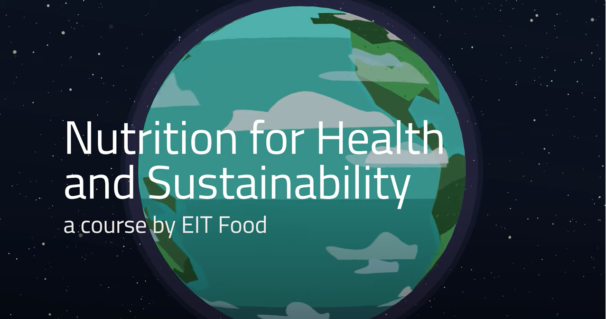How to eat healthy for you and the planet
Find out how a healthy diet can impact your physical and mental wellbeing and benefit the environment. We have worked with EIT Food, Europe’s leading food innovation initiative, to put together a guide on how to eat healthily. Written by Laura Elphick, EIT Food.

Nutrition, health and the environment are consistently making the headlines. Health crises such as undernutrition and obesity, and the Covid-19 pandemic, and environmental crises such as climate change are all top of mind. One topic that links nutrition, health and the environment together is the food that we produce and eat.
Food impacts our health in different ways. It can help to prevent disease but also increase the risk of developing others. Food also affects the health of the planet, as producing it uses up finite resources and causes pollution. Let’s explore the interplay between food, health and the environment!
The role of food in disease onset and prevention
According to the FAO, poor diets contribute to all types of malnutrition, including undernutrition, overweight and obesity and resulting diet-related noncommunicable diseases (NCDs). In fact, unhealthy diets and malnutrition are among the top 10 risk factors contributing to the global burden of disease. For example, diets high in trans and saturated fats can contribute to the risk of cardiovascular disease, diets high in salt can lead to high blood pressure, and diets high in saturated fat meat products have been linked to some cancers.
Some health conditions can also increase the risk of other diseases and make existing conditions worse. For example, obesity has been found to be a risk factor for developing a critical condition in Covid-19 patients (Mária Földi, 2020; Norbert Stefan et al, 2021).
Obesity can also lead to the onset of NCDs such as type 2 diabetes and cardiovascular disease (Stefan, N., Birkenfeld, A.L. & Schulze, M.B, 2021). Our diet plays an important role in the onset of these diseases. Here, NCDs are often associated with low intake of fruits, vegetables, legumes, whole grains, nuts and seeds, calcium and fibre, as well as high intake of red meat, processed meat, sugar-sweetened beverages, trans fatty acids, and sodium (FAO).
As for helping those with existing health conditions, food can make a big difference. A general rule of thumb is that healthy eating can help people with chronic diseases manage these conditions and prevent complications. For example, oats, beans and nuts help to lower LDL (bad) cholesterol, and a low-fat diet that includes lots of fibre, fruit and vegetables can help to lower blood pressure.
The relationship between food and mood
Food also has an important role in our mental health and wellbeing, as the food we eat can impact our emotions. This is because the food we eat directly affects the structure and function of our brain. In general, a balanced diet full of vegetables and nutrients can improve our sense of wellbeing. It can also help to manage symptoms of stress.
Case Study: Food and Stress
According to Nutritionist Resource:
- In general, someone eating a healthy, balanced diet is going to be far less stressed than someone eating a poor diet.
- Some foods can have negative effects on the body when we’re stressed. These include caffeine, foods high in fat and sugar and alcohol.
- Some foods are known as ‘stress-relieving’ foods. These include fruit and vegetables, which provide us with plenty of nutrients and minerals. This is crucial when our body is feeling stressed and using more nutrients than normal.
- Chronic stress can weaken the immune system and affect the body’s defences – leaving a person more susceptible to infection and disease.
[The relationship between food and wellbeing is a complex one. Explore EIT Food’s ‘Food for Thought’ course to learn more]






Food impacts gut health
The human microbiome consists of the bacteria, viruses, fungi, and other single-celled animals that live in the body. The food we eat impacts the types of bacteria that live inside us. This is because each food contains unique components that affect the growth of gut microorganisms, and more widely, our overall health.
In recent years, there has been lots of research into the role of food in gut health, as people want to know whether the food they eat can make them less susceptible to disease. For example, it has been suggested that fermented foods, like plain, natural yogurt, can benefit the microbiota by enhancing its function and reducing the abundance of disease-causing bacteria in the intestines.
Understanding the interplay between diet and gut health creates an opportunity to design and implement prevention strategies for a range of human diseases including obesity, diabetes, cardiovascular disease and mental illnesses such as Alzheimer’s and autism. As such, research into food and the microbiome has the potential to improve, and even save lives, in years to come.
[Explore EIT Food’s ‘The Human Microbiome’ course to explore the role of food in gut health!]
Diets are becoming more personalised
We’re starting to see that food and health are linked, but healthy eating is no longer a ‘one size fits all’ approach. People have varying genes, lifestyles and health conditions that make us all different and unique. As such, our diets need to reflect our individuality.
Foods that are healthy for one person may be damaging to another. For example, insoluble fibre foods like fruits with skin, seeds, raw green vegetables, whole nuts and whole grains are potential trigger foods for those with inflammatory bowel diseases such as Crohn’s disease or ulcerative colitis, yet these foods are often recommended for other people.
To overcome this, personalised nutrition is increasingly being used as an approach to food and health. The aim of personalised nutrition is to make healthy dietary suggestions that are more relevant to the daily life of the individual and help everyone to reach the health condition that they aspire to. It can help people with specific diseases or those who need specialist nutritional support, such as the elderly or those who are pregnant.
For example, one EIT Food project, ‘FOOD4SENIOR’, is exploring the specific nutritional requirements which are needed to promote healthy ageing factors like our cardiovascular system, bones, muscles, joints and eyesight.
Importantly, the essence of personalised nutrition is not to change existing nutritional guidelines or to promote food as medicine. It’s about helping individuals to attain a lasting dietary behaviour change that is beneficial for their health.
According to Associate Investigator at IMDEA-Food Francesco Visioli,“A ‘one size fits all’ diet is no longer seen as viable. Everyone responds differently to food items and their ingredients and it’s time to accelerate research and implement the available technology to properly address individual needs.”
How EIT Food is supporting targeted nutrition
- ONCOFOOD: is developing new innovative food solutions for cancer patients to promote the pleasure of eating and prevent malnutrition.
- Sustained Energy Release for Starchy Food Products: is lowering the rate of starch digestion to reduce the risk of developing NCDs such as obesity and type 2 diabetes.
- Personalised and connected food service providers (PERSFO): is creating a transparent recommendation system that provides access to personalised food advice.
What about food sustainability?
Although it’s important to focus on how food affects our health, we should also remember that the food we produce and eat has implications for the planet. Food production accounts for 26% of global greenhouse gas (GHG) emissions and uses up finite resources like land and water.
In fact, according to the EAT Forum, global food production is the single largest human pressure on earth, as it threatens local ecosystems, contributes to the mass extinction of species, and impacts the stability of the entire Earth system.
However, food is unique in that it can go from being an integral part of the climate change problem to being one of the most important solutions. For example, water and soil used in farming can trap carbon, wasting less food lowers GHG emissions, and eating local saves food miles.
Is there a trade-off between human health and planet health?
Eating a sustainable diet could help to preserve our planet while also keeping ourselves in good health. According to FAO & WHO, this includes:
- Eating more wholegrains, legumes and nuts and an abundance and variety of fruits and vegetables
- Eating moderate amounts of eggs, dairy, poultry and fish, and small amounts of red meat
- Minimised use of antibiotics and hormones in food production,
- Minimised use of plastics and derivatives in food packaging
- Low levels of food loss and waste
[Discover how to build a sustainable diet]
EIT Food’s Nutrition for Health and Sustainability course
EIT Food has launched a brand new online course to explore what makes up a healthy, sustainable diet and help learners to identify how certain food types can help to treat and prevent disease. The course is open to everyone, but specifically targets medical students and professionals to equip them with knowledge and tools to be able to deliver health and nutrition advice on a daily basis.
Edith Visser, PhD student at University of Groningen, describes the course.
- In this course, you will learn about nutritional guidelines and how they are developed.
- In this course, you will build your knowledge of healthy and sustainable diets.
- In this course, you will explore the major forms of malnutrition and how it can be diagnosed and treated.
If you pay attention to what you eat, your health and our planet will thank you!









